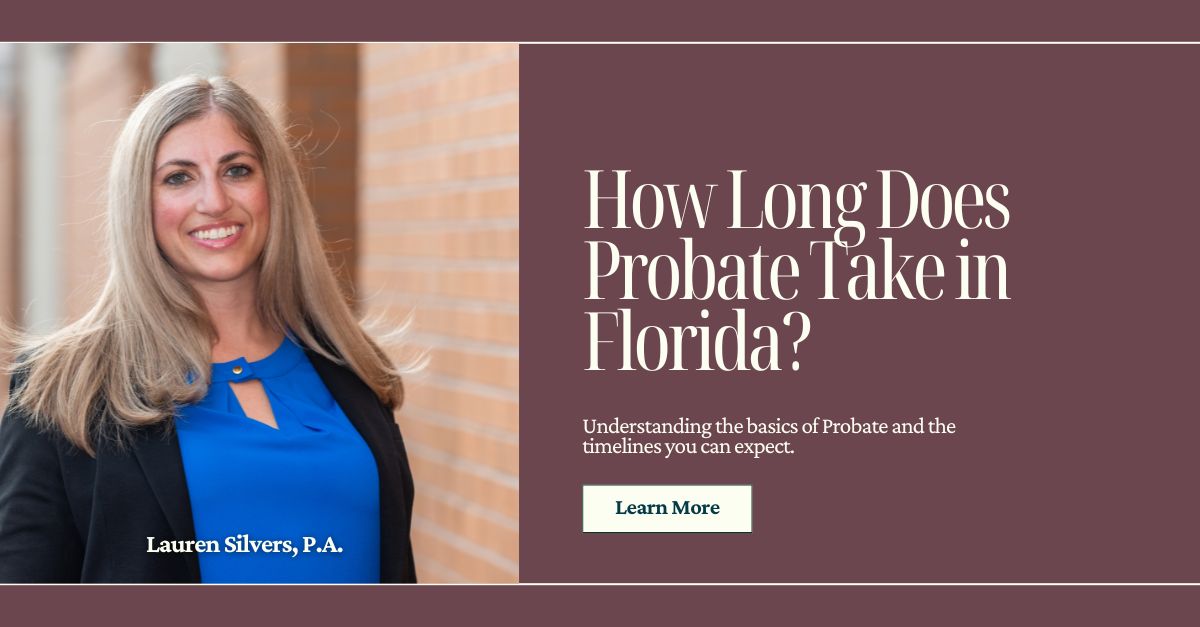
Probate is the legal process of settling a deceased person’s estate, ensuring debts are paid and assets are distributed to beneficiaries. One of the most common questions Florida families ask Silvers Law, P.A. is “How Long Does Probate Take in Florida?”. The answer varies depending on several factors, including the complexity of the estate, court procedures, and potential disputes among heirs.
At Silvers Law, P.A. based in Clearwater, we help families in throughout Florida navigate probate as efficiently as possible. Whether you’re an executor handling a loved one’s estate or an heir waiting for your inheritance, understanding the timeline of probate can help you set realistic expectations and prepare accordingly.
What Factors Influence Probate Duration?
Several factors determine how long probate takes, including:
- Size and Complexity of the Estate – Larger estates with multiple assets or business interests take longer to settle.
- Presence of a Valid Will – If a legally valid will exists, the process is typically faster than when intestacy laws apply.
- Debts and Creditor Claims – The estate must notify creditors, and they have a set period to file claims, potentially extending probate.
- Contested Wills – If heirs dispute the will’s validity, litigation can significantly delay probate.
- Court Backlogs – The timeline can vary depending on the Pinellas County probate court‘s current caseload.
- Tax Issues – If estate taxes are due, additional time may be required for filing and IRS clearance.
Average Probate Process Timeline Explained
In Florida, probate can take anywhere from six months to two years or longer, depending on the complexity of the estate. The process generally follows this timeline:
- Summary Administration (Smaller Estates): 1-6 months
- Formal Administration (Larger Estates): 6-18 months
- Contested Estates or Litigation Involved: 1-3 years or more
A straightforward estate with a clear will and no disputes can often be completed in under a year, while complicated or contested cases take significantly longer.
Steps Involved in the Probate Process
Understanding each stage of probate can help you anticipate potential delays:
1. Filing the Probate Petition (1-2 months)
- The executor (or an interested party) files the necessary paperwork with the probate court.
- If a will exists, it must be validated by the court.
2. Appointment of the Executor or Personal Representative (1-2 months)
- The court officially designates the person responsible for managing the estate.
3. Notification to Creditors and Beneficiaries (3-6 months)
- Creditors have a fixed period (typically 90 days in Florida) to file claims.
- Heirs and beneficiaries are formally notified of probate proceedings.
4. Inventory and Appraisal of Assets (3-6 months)
- The executor must identify, value, and secure all estate assets.
- Financial institutions, real estate appraisers, and business valuation experts may be involved.
5. Settling Debts and Paying Taxes (6-12 months or longer)
- The executor pays outstanding debts, taxes, and final expenses.
- If estate taxes are required, this can extend the process significantly.
6. Distribution of Assets and Closing the Estate (1-3 months)
- Once all debts are settled, the executor distributes remaining assets to beneficiaries.
- A final accounting is submitted to the court for approval before closing the estate.
How Can You Expedite the Probate Process?
While some probate steps are unavoidable, there are ways to speed up the process:
- Have a Clear and Legally Valid Will – Avoid ambiguity and ensure proper execution.
- Work with an Experienced Probate Attorney – An attorney can streamline filings and reduce delays.
- Notify Creditors Promptly – The sooner creditors are notified, the sooner their claims can be resolved.
- Keep Beneficiaries Informed – Clear communication prevents disputes that could slow down the process.
- Use a Living Trust Instead of a Will – Assets in a trust bypass probate entirely, reducing the timeline.
Impact of State Laws on Probate Duration
Every state has its own probate laws, which impact how long the process takes. In Florida:
- The formal probate process typically takes 6-12 months for most estates.
- Summary administration is available for smaller estates (valued under $75,000) and can be completed within a few months.
- Homestead property may be exempt from probate, potentially speeding up the distribution of a family home.
If you are probating an out-of-state property or dealing with ancillary probate (for assets located in another state), additional time may be required.
Ways to Avoid or Minimize Probate Delays
If you’re looking to avoid probate or reduce delays, consider these estate planning strategies:
- Set Up a Revocable Living Trust – Assets held in a trust pass directly to beneficiaries.
- Use Beneficiary Designations – Name beneficiaries on life insurance policies, retirement accounts, and bank accounts.
- Title Property with Joint Ownership – Joint tenancy with rights of survivorship ensures automatic asset transfer.
- Make Gifts During Your Lifetime – Reduce your taxable estate by gifting assets to heirs before death.
- Work with an Estate Planning Attorney – Professional guidance ensures proper planning to avoid probate where possible.
Preparing for Probate Efficiently
If probate is unavoidable, preparation can help reduce stress and delays. Key steps include:
- Organizing Estate Documents – Keep wills, trusts, property deeds, and financial records in one accessible location.
- Choosing a Responsible Executor – Select someone capable of managing probate efficiently.
- Reviewing and Updating Estate Plans – Ensure wills, trusts, and beneficiary designations are current.
- Consulting a Probate Attorney – Legal guidance can help prevent errors and accelerate the process.
Get Probate Assistance from Silvers Law, P.A.
Probate doesn’t have to be overwhelming. At Silvers Law, P.A., we assist families in Clearwater, Florida, with navigating probate efficiently and ensuring estates are settled as smoothly as possible. Whether you need help expediting probate, avoiding probate delays, or preparing your estate for the future, we’re here to guide you.
Contact us today to schedule a consultation and ensure your probate process is handled with care and expertise.

